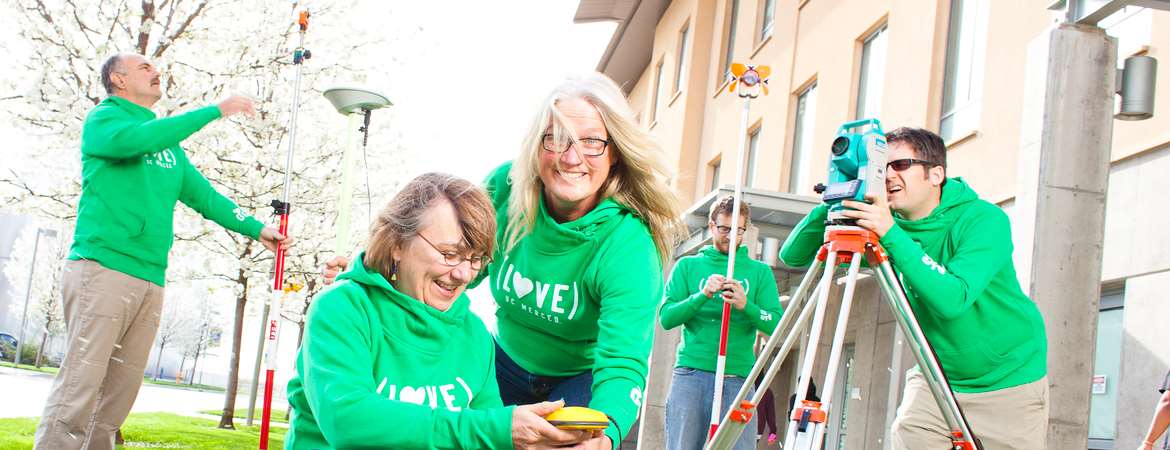
 The Environmental Engineering program at UC Merced is accredited by the Engineering Accreditation Commission of ABET, https://www.ABET.org.
The Environmental Engineering program at UC Merced is accredited by the Engineering Accreditation Commission of ABET, https://www.ABET.org.
Overview
Environmental engineers are distinguished from other environmental professionals through their focus on problem solving, design and implementation of technological or management systems.
Environmental engineers search for creative and economical ways to use resources efficiently, limit the release of residuals into the environment, develop sensitive techniques to track pollutants once released and find effective methods to remediate spoiled resources. They serve as the vital link between scientific discovery, technological development and the societal need for protecting human health and ecological integrity.
In the coming decades, environmental engineers will increasingly be called upon to address broader issues of environmental sustainability by minimizing the release of residuals through altered production processes and choice of materials; by capturing the resource value of wastes through recovery, recycling and reuse; and by managing natural resources to meet competing societal objectives.
The B.S. degree in Environmental Engineering (ENVE) is offered by the School of Engineering through the Civil and Environmental Engineering (CEE) Department faculty.
Environmental Engineering Program Educational Objectives
The program will be consistent with UC Merced degree hallmarks, producing program graduates who will meet the following Program Educational Objectives:
- Critical Thinking: Apply a strong disciplinary foundation and engage in interdisciplinary thinking to approach challenges with an inquiry-based mindset, to critically assess problems, and to create sustainable solutions.
- Professional Development: Demonstrate initiative, respond to challenges with resiliency, learn from failure, and take responsibility for their ongoing education, skill enhancement, and lifelong learning.
- Leadership: Develop leadership, communication, and teamwork skills to effectively assume increasing levels of engineering responsibility, including pursuit of licensure where appropriate.
- Social Responsibility: Understand and contribute to both local and global communities, respect and value differing perspectives and experiences, act ethically, and actively respond to the needs of society.
Environmental Engineering Program Learning Outcomes
For environmental engineering, it is important that the program meets national engineering accreditation (ABET) Student Outcomes while remaining consistent with our institutional Program Educational Objectives.
From this perspective, our ENVE graduates are expected to achieve a set of student outcomes outlined by ABET (www.abet.org) by demonstrating:
- An ability to identify, formulate, and solve complex engineering problems by applying principles of engineering, science, and mathematics;
- An ability to apply engineering design to produce solutions that meet specific needs with consideration of public health, safety, and welfare, as well as global, cultural, social, environmental, and economic factors;
- An ability to communicate effectively with a range of audiences;
- An ability to recognize ethical and professional responsibilities in engineering situations and make informed judgments, which must consider the impact of engineering solutions in global, economic, environmental, and societal context;
- An ability to function effectively on a team whose members together provide leadership, create a collaborative environment, establish goals, plan tasks, and meet objectives;
- An ability to develop and conduct appropriate experimentation, analyze and interpret data, and use engineering judgment to draw conclusions;
- An ability to acquire and apply new knowledge as needed, using appropriate learning strategies.
ABET Alignment
In addition to the seven general PLOs above, ABET prescribes the following specific curriculum content [ABET Criteria for Accrediting Engineering Programs, 2025 – 2026]:
a) Mathematics through differential equations, probability and statistics, calculus-based physics, chemistry (including stoichiometry, equilibrium, and kinetics), earth science, biological science, and fluid mechanics.
b) Material and energy balances, fate and transport of substances in and between air, water, and soil phases; and advanced principles and practices relevant to the program objectives.
c) Hands-on laboratory experiments, and analysis and interpretation of the resulting data in more than one major environmental engineering focus area, e.g., air, water, land, environmental health.
d) Design of environmental engineering systems that includes considerations of risk, uncertainty, sustainability, life-cycle principles, and environmental impacts.
e) Concepts of professional practice and project management, and the roles and responsibilities of public institutions and private organizations pertaining to environmental policy and regulations.
Resources
- Program enrollment and graduation data are available on the Institutional Planning and Analysis website at the following links: (enrollment table) (graduation table)
- Visit the Registrar office for the latest catalog and School of Engineering courses.
Vers. 3/25/25 - dbq



